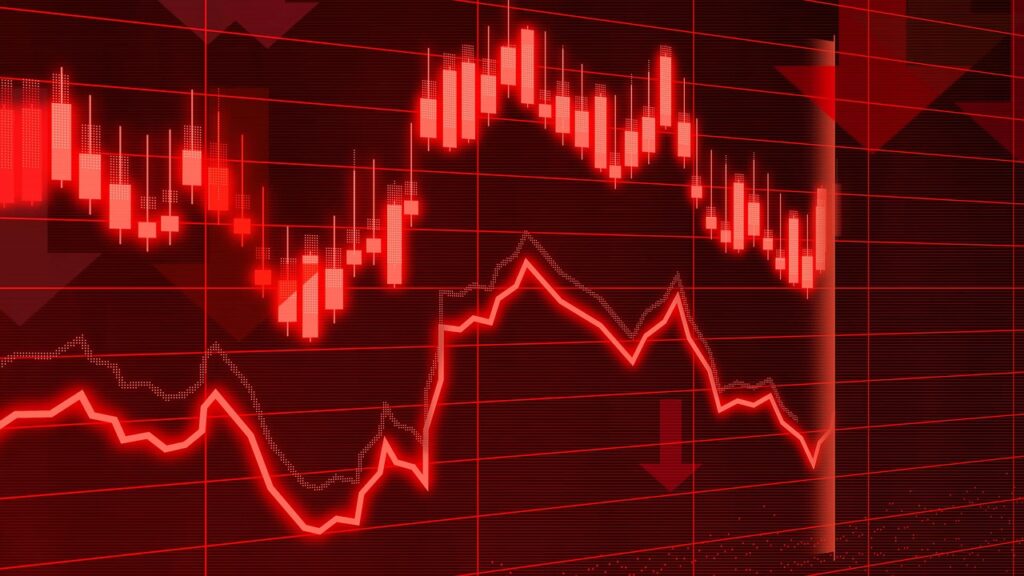Stock Market Down as Value for Financial Companies Sheds $465 Billion
The global financial stock market down and taking a little tumble after Silicon Valley Bank’s “oopsie daisy” moment. It’s not uncommon for financial markets to experience ups and downs. And the reasons for these fluctuations can be complex and varied. Something like a jobless claim surpassing 200,000 for the first time in months can cause massive volatility in the market.
Financial stocks around the world have been hit hard by Silicon Valley Bank’s collapse. Investors are cutting their exposure faster than a surgeon with a shaky hand, leaving lenders from New York to Japan feeling about as loved as a cockroach at a picnic. The drop in market value for companies included in the MSCI World Financials Index and the MSCI EM Financials Index. In just two short days, the MSCI World Financials Index and the MSCI EM Financials Index have shed a whopping $465 billion. This causes losses to widen faster than a politician’s lies on election day.
However, it’s worth noting that some financial institutions in northern Asia appear to be resilient to the effects of Silicon Valley Bank’s collapse. The MSCI Asia Pacific Financials Index took a beating worse than a rented mule, dropping as much as 2.7% to the lowest since Nov. 29. However, some of the major northern Asia banks have little risk of collapsing like a house of cards. According to Bloomberg Intelligence analyst Francis Chan, these banks have solid deposits, asset mixes, and liquidity, which may help protect them from sudden runs on deposits.
Bonds and Other Financial Instruments Feeling the Heat
buckle up everyone, because the collapse of Silicon Valley Bank is starting to feel like a game of dominoes. There’s a growing fear that the market turbulence could spread like a wildfire, causing a whole lot of chaos in the financial system. Bonds and other financial instruments are feeling the heat, and investors are starting to get a little nervous about what’s coming next.
On Monday, the drop in treasury yields was like a warning shot across the bow, indicating that the Federal Reserve might hold off on raising rates in response to the turmoil. And let’s be honest, if the Fed starts pumping the brakes, we could be in for a world of hurt. Credit Suisse Group AG’s chief investment officer for Asia-Pacific, John Woods, is already speculating that the Fed might pause as a result of the liquidity risk posed by the situation. Pause? Delay? Let’s just call it what it is: a big, fat, mess.
European Bank Bond Default Insurance Soars
Well, it looks like the regional banks in the US got hit harder than a piñata at a children’s birthday party. The KBW Regional Banking Index took a nosedive on Monday, and investors are not taking it lightly.
First Republic Bank has been particularly unlucky, as the stock market down, their shares drop like a rock by a whopping 73% over just three sessions. Moody’s is also putting their long-term ratings on review for downgrade, which is basically like saying “you’re in trouble, buddy”.
But the nightmare doesn’t end there. The price of insuring European banks’ bonds against default is very high. With Credit Suisse Group AG’s stock taking a beating. Because of Silicon Valley Bank’s collapse, everyone seems to be concerned about a domino effect in the banking industry. So, if you’re exposed to the banking industry, you might want to tuck yourself in, because things are about to get crazy.
Japanese Stock Market Down, Taking a Hit After Silicon Valley Bank Collapse
Well, it seems like the fallout from Silicon Valley Bank’s collapse has reached all the way to Japan, and it’s hitting their financial stocks hard. It’s a real shame, especially since the country’s central bank was starting to pivot towards tightening after years of ultra-loose monetary policy.
Bloomberg’s data paints a pretty bleak picture, with Japanese banks featuring prominently among the highest unrealized loss-to-equity ratios in the Asia Pacific region. Jimoto Holdings Inc., Tsukuba Bank Ltd., and Fukushima Bank Ltd. are just a few examples of those with unrealized loss-to-equity ratios of at least 9%. Also, all three have seen their market caps plummet by more than 10% in just three days.
It’s clear that Silicon Valley Bank’s collapse is sending shockwaves throughout the financial system. And it’s putting a lot of pressure on banks and other financial institutions to mitigate the risks posed by their investments in various financial instruments. It’s a tough situation all around, and it just goes to show that the ripple effects of a financial collapse can be felt far and wide.
The Fallout from Silicon Valley Bank’s Collapse
Fund managers are starting to hit the panic button and selling off their holdings in banks and insurers after the fallout from Silicon Valley Bank’s collapse. According to Bloomberg Taku Ito, the chief fund manager at Nissay Asset Management Corp. admitted that many fund managers are doing the same thing. He pointed out that bank shares had been on the rise and many growth managers had been increasing their holdings in these sectors.
The current situation is understandably spooky for some fund managers. It’s a crazy time in the financial markets, and nobody knows what’s going to happen. Some managers seem to err on the side of caution when it comes to knowing when to hold and fold. It’s also possible that some fund managers are just taking advantage of the situation. Only time will tell which strategy will prove to be the right one.
The Impact of Silicon Valley Bank’s Collapse causing Stock Market Down
In conclusion, the financial markets are currently facing a lot of uncertainty in the aftermath of Silicon Valley Bank’s collapse. It’s evident that some financial firms are already feeling the effects of their exposure to SVB, with US regional banks and Japanese financial stocks among the worst affected.
The current situation has created a lot of volatility in the financial markets, and this is likely to continue in the short term as the fallout from Silicon Valley Bank’s collapse continues to play out. It’s crucial to keep a close watch on how this situation develops and to be prepared for the possibility of further market disruptions in the future.



